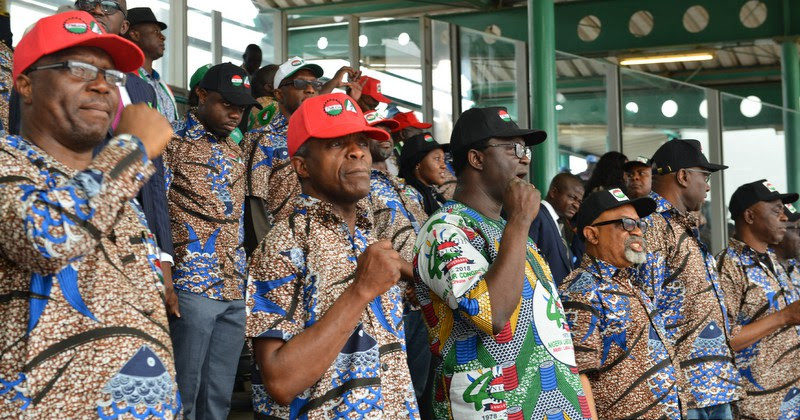
Labour leaders in the country have threatened to use their electoral power come 2019 against any government that refuses to pay the new minimum wage currently being negotiated in the country.
The workers also warned against attempt to renegotiate their demand for N66,500 as the national minimum wage in the country. The existing minimum wage is N18,000.
The President of the Nigeria Labour Congress (NLC), Ayuba Wabba, issued the threat on Tuesday in Abuja in his message to the Nigerian workers to celebrate May Day 2018.
“We are battle ready against public and private organisations that would refuse to conform to the new minimum wage. At our disposal is the power of our votes. We shall ensure that governments that refuse to pay the new minimum wage will not receive the support of the working class, pensioners and their families,” he said.
Wabba urged the government to approve the minimum wage law and ensure all employers in public and private sectors paid the N66,500 package without further delay.
The labour leader said although the process to review the national minimum wage upwards was ongoing since the inauguration of the tripartite committee for that purpose last year, immediate payment would help pull workers out of poverty.
He said, “An increase in the minimum wage will raise the levels of productivity and enhance the purchasing power of workers. The current demand of N66,500 as national minimum wage will only manage to meet the basic needs of the average Nigerian worker if inflation is kept at a single digit.”
Wabba appealed to the Federal Government to ensure that federal allocations were not released to states and local governments that refuse to implement the new minimum wage.
From the first minimum wage of N125 in 1981 to the current N18,000, Wabba said workers have always been forced to “bargain so hard, wait for too long for wages that usually tend to mock their contributions to national development”.
The NLC President also lamented the poor state of the country’s economy, which he said has remained “essentially rent seeking” as a result of “systemic distortions” from over-dependence on crude oil revenue.
While commending the Buhari administration for attempting to diversify the economy, particularly through agriculture, the labour leader drew attention to fundamental structural issues undermining inclusive growth and negatively impacting sustainable development.
With unemployment rate growing from 16.2 per cent to 18.8 per cent in the third quarter of 2017, the labour leader said the country’s current economic structure hardly supports mass industrialisation and capacity for sustainable job creation for the teeming population of jobless youths.
He identified industrialisation as the only way out. He said although Nigeria was among the three leading economies in Africa, including Egypt and South Africa, the value addition by the country’s manufacturing sector to the economy was too low.
Nigeria’s gross domestic product is put at $406 billion; Egypt $332.3 billion and South Africa $294.1 billion.
But, value addition, in terms of manufacturing in South Africa is about 25 per cent; Egypt 20 per cent against Nigeria’s less than five per cent.
“To meet the Sustainable Development Goals 2030, especially SDG 9 dealing with industry and innovation, Nigeria must urgently innovate, revive closed textile, steel and engineering mills. We must industrialise,” Wabba said.
Speaking at the event, Vice President Yemi Osinbajo assured the workers that the Buhari-led administration is not ignoring their demands of better working conditions.
He said the argument for a new national minimum wage cannot be protested “because it is the minimum amount of compensation that an employee must receive for putting in his or her labour”.
According to him, “This administration has no intention of ignoring the demands of labour. It is my hope that the tripartite committee will work to enable the Federal Government to send an executive bill on a new national minimum wage to the National Assembly for passage into law as soon as possible.”
He called on members of labour unions in the country to remain united and cooperate with the Federal Government.
Copyright Ships & Ports Ltd. Permission to use quotations from this article is granted subject to appropriate credit given to www.shipsandports.com.ng as the source.
